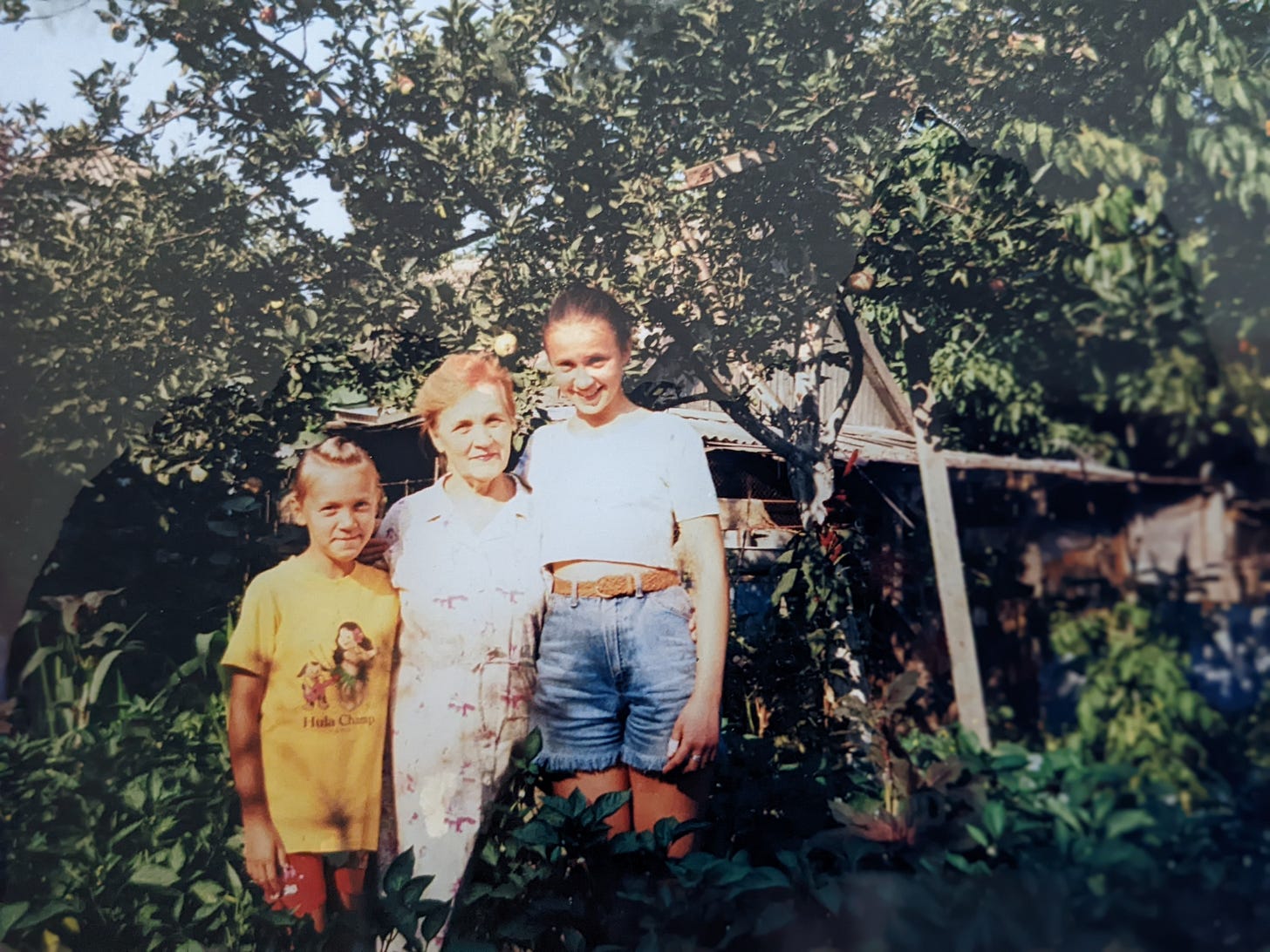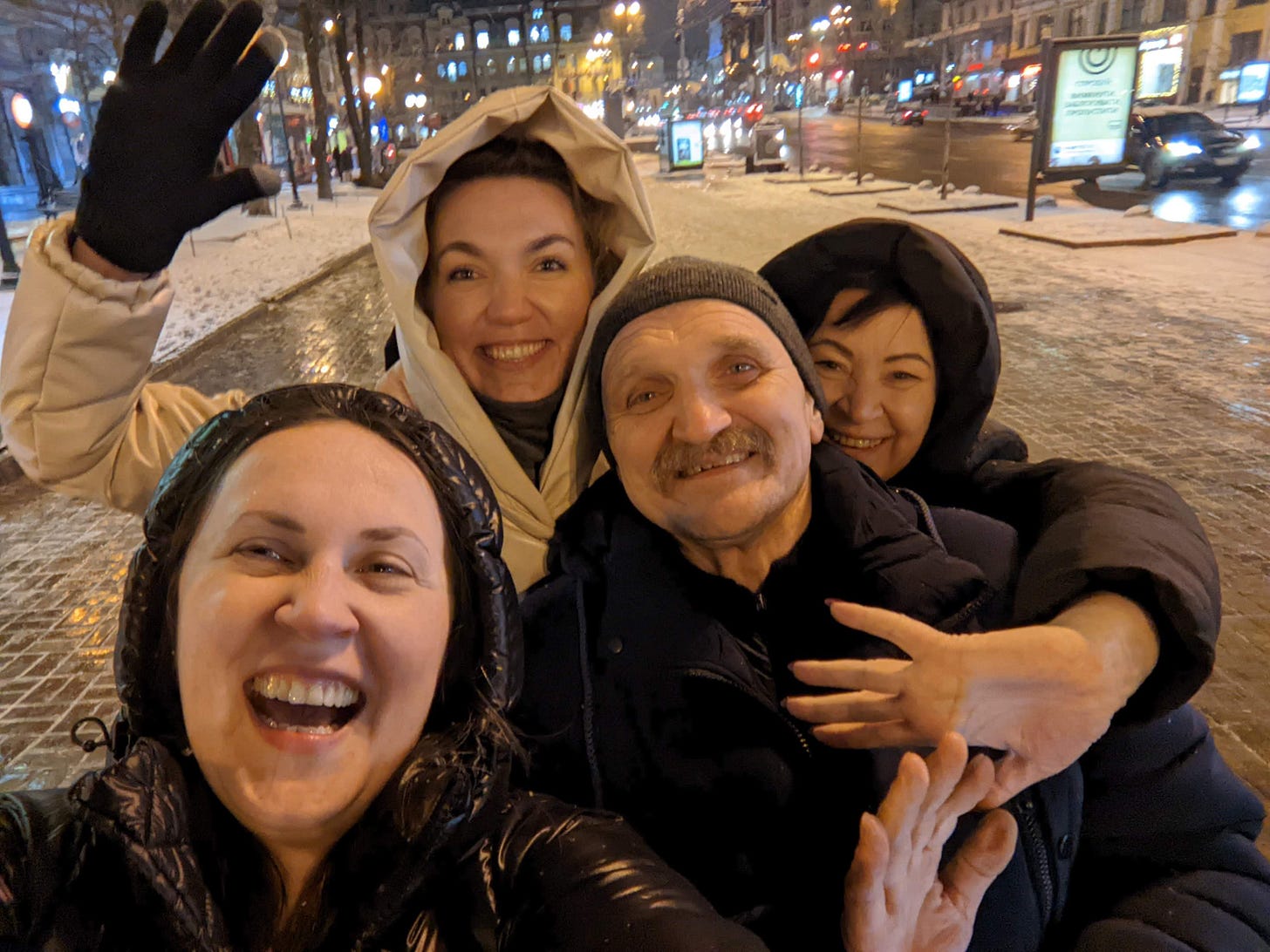Following is an excerpt from Light in the Fields, a memoir of growing up in post-Soviet Ukraine and immigrating to the USA by Yuliya Shirokova, to be published by Blue Ear Books. A second excerpt will be published on Friday, March 3.
I came home from work completely exhausted. For the past couple of weeks, getting anything done at work had been a herculean effort. Today, though, all the tasks seemed to very effectively fall into place. I did not need to negotiate, search, beg, or bargain with anybody. Yet I felt completely drained, and it was only the middle of the week! Mechanically, I went through my post-work routine. Feed the dog, change clothes, walk the dog, prepare lunch for tomorrow. Nothing was shaking the melancholy, the feeling of worry inside me. Almost like an anxiety attack, deep sadness kept filling my chest, making it hard to breathe. I wanted to talk to my mom or sister, but it was still too early in Czechia and Ukraine. They would be getting up for work in a couple of hours. I guess I will be going to bed very late today, I thought to myself.
It was now 9:30 p.m. and I was sitting in my backyard, under the gazebo. My garden lights were glimmering around me, and the cold evening seemed warmer, with its peaceful windless quiet and the complementary light coming from my neighbors’ windows. I was halfway through a glass of red wine and a cigarette, but the usual calming of the mind that I look forward to was not coming. The feeling of sadness just seemed to intensify. I still had to wait at least half an hour before calling my family, so I called the other person closest to me, my childhood friend who also lives on the West Coast. I knew she was probably putting her kids to bed, so I did not expect her to pick up. I was already thinking of who I should call next, but she startled me by answering.

“Oh! Hi!” I stuttered. “How are you?” I was going to follow it up with, “How is your family?” But she abruptly interrupted me.
“How do you think I’m doing?! The parents are at their dacha, and they are bombing Hostomel airport!” I was trying to catch up with what she was saying. Who was bombing whom? Hold on, where is her parents’ dacha? Bombing? Had I heard her right?
The realization washed over me like an abrupt full body submersion into ice water: “The Russians have crossed the border! The war has begun!” She began to say something, but I mindlessly interrupted her. “How are your parents? Do they have a cellar? How about food? Do they have an option to leave?” All the questions came out of me in one breath. Her parents were okay for now. They were hearing the explosions and shootings very clearly, and were seeing the color of the sky change with all the artillery shots and explosions on the other side of the forest line. They had moved their bedroom to the ground floor. This was the only full cement part of their house, with no large windows and all the preservatives Aunt Tonya had made over the past year. They should be good on food for a while. For now, they were refusing to leave. “Let these kacapy come here! We will show them whose land this is!” This was just like Aunt Tonya and Uncle Vasya. It made me smile, but it also made me worry.
*
On February 24, 2022, at 3:40 a.m., the Russian army crossed the Ukrainian border on several fronts. The elite Russian soldiers who would later become infamous as the sadists of Bucha crossed the Ukraine-Belarus border in the north. On their way to capture Kyiv, one of their first orders was to capture the Hostomel airport, to ensure safe arrival of their airborne squads. I had to look at a map to assess exactly how near Hostomel is to the border. Ana’s parents had spent their whole life and most of their savings building this home, where they were living in semi-retirement. They might lose everything they had worked for, but they needed to leave. The conflict was only going to intensify, and the Russian troops were just too close. Ana said that was exactly what she was explaining to her parents. I asked her to let me know if there was any help I could offer, then we said goodbye. What I had most feared was under way.

In my backyard, under my gazebo, with the soft lights of the garden surrounding me and the crisp night enveloping my face and hands, I looked around, feeling the loneliness and silence of the night. I was numb, and at the same time I was full of fury. I called my sister. She picked up immediately, and I could tell that she had been awake for a while.
“I just spoke to Ana,” I told her. “The bombing is at full force over in Hostomel. Her parents are there now. She is trying to persuade them to evacuate.”
In a shaken but calm voice, Irene said: “I am listening to the news and paying attention to a couple of news channels on Viber and Telegram. Depending on where you are in Kyiv, different things are happening. We are getting air raid sirens throughout every hour, but so far no bombs. A lot of aircraft activity from Zhuliany. The basement in our building has been prepped as a bomb shelter, so next time there is a siren, Dasha, her parents, and I will be going down there.”

I heard the familiar ding sound in the phone and our mother joined the call from the Czech Republic. She was getting ready for work and did not realize that the full-scale Russian invasion had begun just two hours earlier. She asked why we were on a call so early and if everything was okay. My sister and I both paused. A moment of silence. “Girls, what’s wrong?!” Overcoming the tightness in my chest, I said: “They have invaded.” She asked: “Who?!” and I said: “The same ones that have been standing at the border.” We stayed quiet. Mom was processing. “You mean the Russians?” All I could muster to say was: “Yes.” So much rage and paralysis was in my body that I could not even pronounce “Russians”. Still could not believe it.
I tried to stay calm and went into solution mode, sharing every lesson I had learned from my training in the U.S. Army about active theater. We made a plan. We would stay on the phone whenever my sister was not in the shelter, to make sure we stayed in touch. Irene was refusing to evacuate. Her reasoning was that if everyone ran, then who would be left to rebuild the country? I understood her logic, but at the same time could not believe this was the reality. Another siren began, and we had to hang up. Irene would text us once she came out.
A second excerpt will be published next Friday, March 3. Yuliya Shirokova is a local healthcare professional in Washington state, a former U.S. Army medic, and a Ukrainian immigrant. Over the past couple of decades she has had the challenge and pleasure of balancing a life divided between two different worlds on two continents. In her upcoming memoir, Light in the Fields, she will be sharing the experience of growing up before and after the breakup of the USSR, seeing the U.S. through the eyes of a teenage immigrant, and bearing witness to the current war in Ukraine.






This and the events of the entire last year have brought back so many memories of our life in Kyiv (1996-1998). I continue to pray for the people of Ukraine. Thank you for sharing you own experiences as the war unfolded.